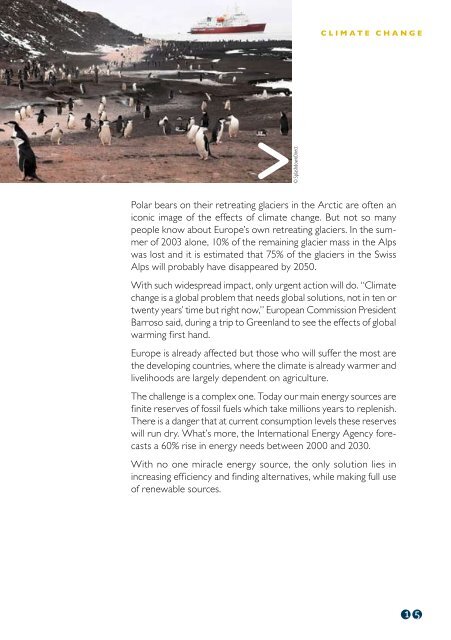A SUSTAINABLE FUTURE IN OUR HANDS - To Parent Directory
A SUSTAINABLE FUTURE IN OUR HANDS - To Parent Directory A SUSTAINABLE FUTURE IN OUR HANDS - To Parent Directory
Climate changeSituation on the groundLong considered hypothetical, the effects of climate change arenow unmistakable. From cooler winters to hotter summers, ourseasons are increasingly marked by extremes in weather. Elevenof the world’s twelve warmest years on record occurred between1995 and 2006. And while this was welcome for some, it wasdevastating for many.The scorching heat wave that hit Europe in the summer of 2003claimed 35,000 lives, approximately half from France. Many alsodied in Germany, Spain and Italy. Temperatures in the UK exceeded38°C for the first time ever recorded. These heat wavesare projected to increase in both frequency and intensity in theyears to come. But if Europe is already struggling to cope now,what will it be like then? In the twentieth century, the temperaturein Europe increased by 0.95°C compared with the global averageof 0.76°C.It’s not just hotter and colder seasons that we’re experiencing,but wetter and drier ones too. A contrasting picture is formingin Europe, with the north becoming wetter (10-40% since 1900)and the south becoming drier (up to 20% since 1900). The resultingfloods on one hand and droughts on the other are having aconsiderable impact on agriculture and water sources. If currenttrends continue, this can only get worse.The economy is also affected - extreme weather conditions areblamed for 79% of economic loss due to catastrophes. On averagethere were twice as many incidents of disastrous weather conditionsin the 1990s than in the 1980s.Patterns are emerging in the ecosystem too. Certain plant speciesare moving northward now that the climate is warmer, increasingdiversity in some areas and lowering it in others. Certain insectsare also taking flight, and ticks, for example, are being found furthernorth than ever before. The consequences of this appear to begreater tick-borne diseases in the Baltic countries and in centralEuropean countries.014
Climate change© SplashdownDirectPolar bears on their retreating glaciers in the Arctic are often aniconic image of the effects of climate change. But not so manypeople know about Europe’s own retreating glaciers. In the summerof 2003 alone, 10% of the remaining glacier mass in the Alpswas lost and it is estimated that 75% of the glaciers in the SwissAlps will probably have disappeared by 2050.With such widespread impact, only urgent action will do. “Climatechange is a global problem that needs global solutions, not in ten ortwenty years’ time but right now,” European Commission PresidentBarroso said, during a trip to Greenland to see the effects of globalwarming first hand.Europe is already affected but those who will suffer the most arethe developing countries, where the climate is already warmer andlivelihoods are largely dependent on agriculture.The challenge is a complex one. Today our main energy sources arefinite reserves of fossil fuels which take millions years to replenish.There is a danger that at current consumption levels these reserveswill run dry. What’s more, the International Energy Agency forecastsa 60% rise in energy needs between 2000 and 2030.With no one miracle energy source, the only solution lies inincreasing efficiency and finding alternatives, while making full useof renewable sources.015
- Page 1 and 2: A GUIDE TO THE EU’S SUSTAINABLE D
- Page 3: A GUIDE TO THE EU’S Sustainable D
- Page 7 and 8: Sustainable Development General int
- Page 9 and 10: General introduction© CorbisThe EU
- Page 11 and 12: General introductionMaking a differ
- Page 13: Sustainable Development Climate cha
- Page 17 and 18: Climate change© CorbisDidyou know
- Page 19 and 20: Climate changeRenewable energy is a
- Page 21 and 22: Climate changeDomestic household ap
- Page 23 and 24: Sustainable Development Sustainable
- Page 25 and 26: Sustainable transport© CorbisDidyo
- Page 27 and 28: Sustainable transport• Listening
- Page 29 and 30: Sustainable Development Consumption
- Page 31: Consumption & production© CorbisWh
- Page 35 and 36: Consumption & productionOften the m
- Page 37 and 38: Sustainable Development Natural res
- Page 39 and 40: Natural resourcespolar bears. It is
- Page 41 and 42: © CorbisNatural resourcesdioxin in
- Page 43 and 44: Natural resourcesTo manage the amou
- Page 45 and 46: Sustainable Development Public heal
- Page 47 and 48: Public healthDidyou know…More peo
- Page 49 and 50: Public healthDidyou know…Accordin
- Page 51 and 52: Public healthhelp you to cut back.
- Page 53 and 54: Sustainable Development Social incl
- Page 55 and 56: Social inclusion© CorbisDidyou kno
- Page 57 and 58: Social inclusion• Promote employm
- Page 59 and 60: Social inclusionthemselves trapped
- Page 61: Not really a ‘people person’ bu
Climate change© SplashdownDirectPolar bears on their retreating glaciers in the Arctic are often aniconic image of the effects of climate change. But not so manypeople know about Europe’s own retreating glaciers. In the summerof 2003 alone, 10% of the remaining glacier mass in the Alpswas lost and it is estimated that 75% of the glaciers in the SwissAlps will probably have disappeared by 2050.With such widespread impact, only urgent action will do. “Climatechange is a global problem that needs global solutions, not in ten ortwenty years’ time but right now,” European Commission PresidentBarroso said, during a trip to Greenland to see the effects of globalwarming first hand.Europe is already affected but those who will suffer the most arethe developing countries, where the climate is already warmer andlivelihoods are largely dependent on agriculture.The challenge is a complex one. <strong>To</strong>day our main energy sources arefinite reserves of fossil fuels which take millions years to replenish.There is a danger that at current consumption levels these reserveswill run dry. What’s more, the International Energy Agency forecastsa 60% rise in energy needs between 2000 and 2030.With no one miracle energy source, the only solution lies inincreasing efficiency and finding alternatives, while making full useof renewable sources.015



